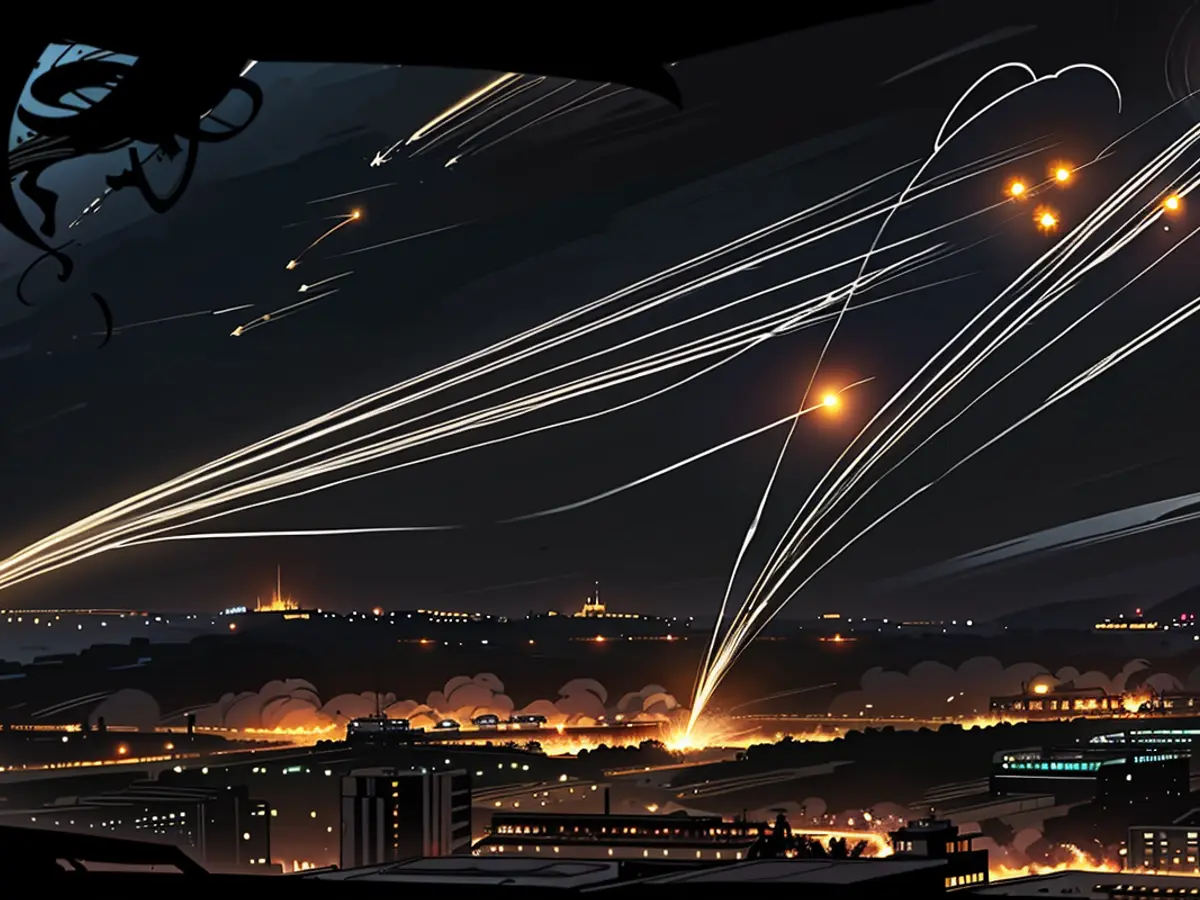- Report: Israel prepares for war on all fronts
Background
Israel's security forces are reportedly on high alert in the face of massive threat of attacks from its arch-enemies. It is expected that the attacks threatened by Iran and the Lebanese Shia militia Hezbollah will occur "on multiple fronts," Channel 12 reported.
This would mean that, in addition to Hezbollah, other armed proxy groups of Tehran could also participate in an aggression against Israel. These include the Houthis in Yemen, as well as Iran-backed militias in Iraq and Syria. The Israeli leadership is currently discussing possible responses to such a coordinated attack, which could include "readiness to enter a comprehensive war," Channel 12 reported.
Hezbollah fires dozens of rockets at Northern Israel again
In response to what is believed to be an Israeli attack in southern Lebanon, the pro-Iranian Lebanese Hezbollah said it fired dozens of rockets at Israel again. For the first time, Katyusha rockets were fired at the town of Beit Hillel in Northern Israel, Hezbollah said. This was in response to Israeli attacks on villages like Kafr Kila in southern Lebanon, where civilians were injured. According to Lebanese security sources, around 50 rockets were fired from southern Lebanon at Northern Israel. Israeli media reported that many rockets were intercepted by the Iron Dome defense system. Since the outbreak of the Gaza war, there has been daily shelling between Hezbollah and the Israeli military.
Fears of a regional wildfire
The scenario of a possible regional wildfire has emerged since two high-ranking enemies of Israel have been killed in deadly attacks. In the early hours of Wednesday, an explosion in a government guesthouse in Tehran killed Hamas' external chief, Ismail Haniyeh. Hours earlier, an airstrike killed senior Hezbollah commander Fuad Shukr in Beirut.
Israel claimed responsibility for the attack on Shukr, but has not commented on the attack on Haniyeh. Iran and Hamas blame the Jewish state for his assassination.
Iran threatens "divine retribution"
Iran threatens a harsh retaliation. This would also involve the Iran-backed militias in the region, said the commander of the Islamic Revolutionary Guard Corps (IRGC), General Hussein Salami. "The criminal and terrorist Zionist regime (Israel) and its supporters must expect the wrath of the resistance groups," he wrote on the website of the Revolutionary Guards.
The circumstances surrounding the killing of the Hamas leader remain unclear. Iran again denied reports by Western media that Israeli agents had planted a bomb in the guesthouse guarded by the Revolutionary Guards two months before Haniyeh's trip and detonated it remotely.
According to the Revolutionary Guards, the attack was carried out with a short-range projectile equipped with a seven-kilogram warhead, fired from outside the guesthouse in the north of the capital. This caused the explosion that killed Haniyeh.
It remains unclear when the threatened retaliation will take place. In the statements by Iran and Hezbollah, there is often talk of the "next few days." Israel can count on the support of the USA and other allies.
Due to threats from Tehran, it is feared that an attack this time could be broader and more complex than Iran's April assault on Israel. Then, Tehran targeted the Jewish state with over 300 rockets, cruise missiles, and drones. That wave of attacks was in response to an Israeli strike that killed several Iranian generals in a building housing Iran's embassy in Beirut.
In the operation now expected, Iranian proxy groups in Iraq and Syria could attack U.S. bases in eastern Syria, the American Institute for the Study of War (ISW) wrote. Local media reports suggest Iran-backed militias have moved troops and rocket launchers from Iraq to Syria, near the U.S. bases. Tehran's calculation could be to tie up U.S. defense capabilities with attacks on the U.S. bases in Syria, which could otherwise be used to defend Israel.
U.S. President Joe Biden and other U.S. officials see a key to de-escalation in a ceasefire agreement for the nearly ten-month-long Gaza conflict. Indirect talks for this, mediated by the U.S., Egypt, and Qatar, are stalled. These talks are also aimed at securing the release of around 100 hostages held by Hamas. The latest round of talks in Cairo on Saturday made no progress, Israeli media reported.
Alleged shouting matches in the PM's office
Mediators, and reportedly close aides to Netanyahu, blame the Israeli prime minister's intransigence for the stalemate in talks. Channel 12 and well-connected journalist Barak Ravid reported a heated meeting last Wednesday, where shouting matches allegedly occurred. Shin Bet chief Ronen Bar reportedly confronted Netanyahu, asking him to openly say if he doesn't want a deal. Netanyahu then allegedly called his aides "cowards" working for Hamas leader in Gaza, Yahya Sinwar.
Protesters demanding a deal for the hostages' release often accuse Netanyahu of blocking a Gaza agreement. Thousands demonstrated in Tel Aviv, Jerusalem, Haifa, and other Israeli cities on Saturday. Former diplomat Eran Etzion told "Times of Israel" at a Jerusalem rally that the deal is on the table, but Netanyahu is blocking it for "political, personal, and legal reasons."
Canada warns against travel to Israel
Meanwhile, Canada warned its citizens against traveling to Israel. The foreign ministry advised Canadians to avoid all travel due to the "ongoing regional armed conflict and unpredictable security situation." The security situation could deteriorate further without warning.
The United States has expressed its support for Israel in the face of potential threats, reiterating its commitment to Israel's security. The United States Secretary of State Antony Blinken stated, "We stand with Israel and dedicate ourselves to ensuring its security and stability."








